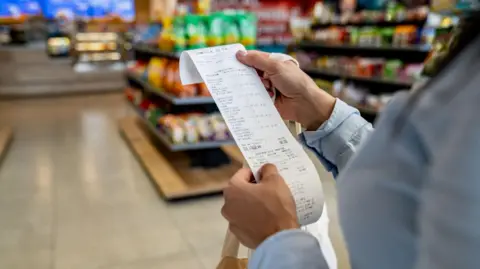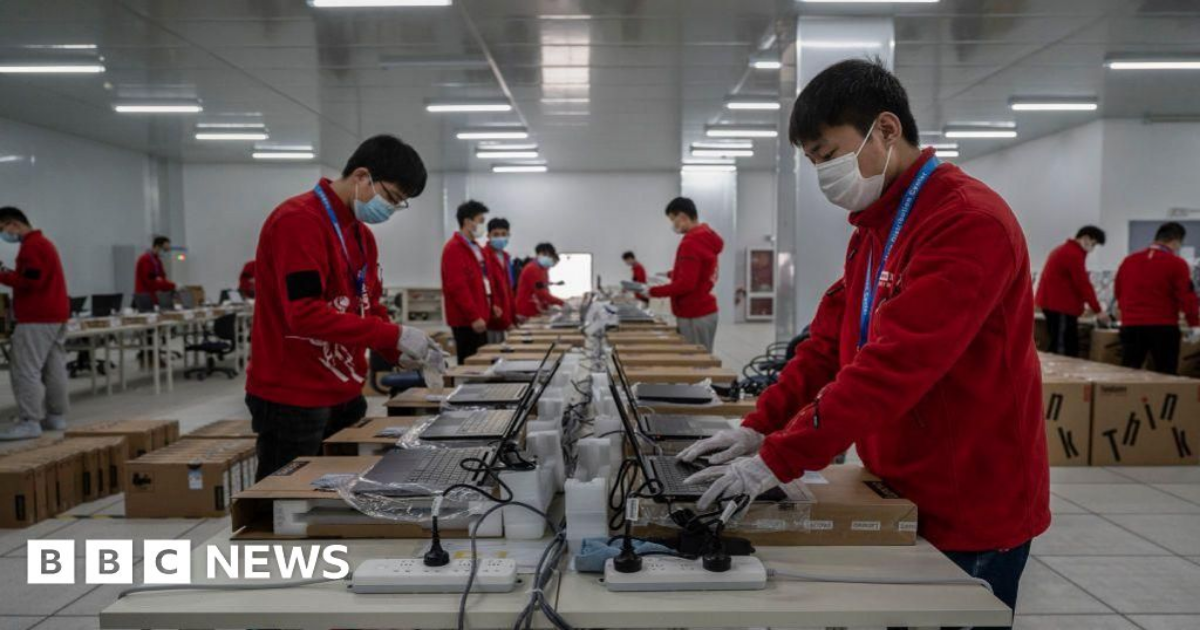
 Getty Images
Getty Images
Donald Trump slaps much of the world with a 10% baseline tariff while others face even higher rates. Our correspondents answer your questions.
From Saturday, all goods imported to the US from anywhere in the world will face a 10% “baseline” tariff.
Donald Trump announced higher rates for some countries he singled out as the “worst offenders” for trade.
Our correspondents have been answering your questions about what this means and the impact it could have.
What happens to US products that are made in China?
Mike Heafield, 60, in Preston, asks Senior Technology reporter, Graham Fraser, What happens to products – like the iPhone – that are made in China by US companies?
One eye-catching consequence of the tariffs announcement has been the impact on Apple, with its share price falling 7%.
The US tech giant has large manufacturing bases in some of the countries hit hardest by President Trump’s policy – notably China, which faces tariffs of 54%, and Vietnam (46%).
In 2019, when Trump was first in the White House, Apple was given Chinese tariff exemptions. Apple bosses will be hoping to work out a similar deal this time.
The global investment bank Citi said: “If Apple cannot get exempted this time and assuming Apple gets hit by the accumulative 54% China tariffs and does not pass it through, we estimate about 9% negative impact to the company’s total gross margin.”
In February, Apple committed to invest more than $500bn (£396bn) in the US over the next four years. At the time, Trump claimed Apple’s support for US manufacturing was partially a response to his trade policies, including tariffs.
How will the tariffs impact US consumers?
Paul Miller, in Devon, asks Dharshini David, Deputy Economics editor, about the impact of tariffs on US consumers, and whether the UK could gain from them.
US shoppers could very much be the frontline casualties in this trade war, blighted by higher prices and less choice, regardless of the president’s rhetoric.
And that does mean that producers will seek out and take advantage of new markets.
We saw that in the president’s first term, when the likes of Vietnam and Malaysia took advantage of the tariffs he imposed on China to increase the amount they sold to America.
Ironically, they consequently are in the firing line now – and so will likely be vying to sell more to the UK – good for consumers, less so for competing businesses
Already, many producers are turning their sights beyond established customers – think whisky makers looking towards Asia. That is likely to intensify.
Trump’s announcement may mean a redraft of the global trade map – and our own shopping lists.

 Getty Images
Getty Images
Will this have an effect on the UK’s cost of living?
Jock Scott, from Nuneaton, asks Business reporter Nick Edser if the US tariffs have an effect on the UK’s cost of living.
As ever when looking at the implications of the tariffs, there’s a lot of uncertainty over this. In some circumstances UK prices could go up, in others they could fall.
The tariffs announced by Trump on Wednesday will be paid for by the businesses which import goods into the US. This means the initial impact of price rises is likely to be on US consumers, if American firms pass on the extra costs.
However, some economists think the tariffs could strengthen the value of the dollar against other currencies. If the pound weakens against the dollar, then UK firms importing goods from the US will face higher costs. This could then lead to higher prices of these goods in UK shops if companies cannot absorb the increased costs themselves.
Also, if the UK government decides to retaliate with tariffs of its own on US goods entering the UK, there is a risk UK prices could rise if British businesses pass on the extra costs to customers.
However, some economists have suggested prices could also fall as a result of the tariffs.
Swati Dhingra, an economist and member of the Bank of England’s monetary policy committee, which sets interest rates, has suggested that firms which normally send their goods to the US may instead send them to countries which don’t have such steep tariffs, like the UK, potentially leading to a flood of cheaper goods.

 Getty Images
Getty Images
What does this mean for my pension?
Robert Jones, from Cardiff, asks Kevin Peachey, Cost of living correspondent, about the impact of tariffs on our pension investments.
There is little doubt Trump’s announcement on tariffs has led to immediate moves in share prices and are also likely to have a longer-term economic impact.
Robert and Stephen have mentioned the drop in the value of their pension investments, and the situation will be unsettling for millions of people with any kind of investments.
Experts say that investors have always had to ride economic shocks. Investments, by definition, require a long-term outlook and strategy. So, they are urging people not to panic or make knee-jerk decisions.
That said, for those about to draw on investments, it may be more worrying, albeit that most pension savings are moved into safer holdings like cash or bonds as people approach retirement age. The state pension is unaffected.
Does the UK have a ‘Brexit benefit’ over the EU?
Paul Naldrett from Windsor asks Business correspondent Marc Ashdown if the UK’s position outside of the European Union is actually an opportunity as the EU is given 20% tariffs.
Some are referring to a “Brexit benefit” because the UK is only subject to 10% tariffs rather than the 20% being slapped on the EU.
Not only will that limit the pain felt by British businesses compared to their European neighbours, but it could present trading opportunities.
UK exporters to America could have a competitive edge, with US importers only facing half the tax by dealing with UK businesses instead of EU businesses.
British firms – and consumers – could also benefit from cheaper goods finding their way here instead of America if the extra costs prove insurmountable.
But, there are concerns about the impact that could have on homegrown industries if cheap products, possibly with lower standards, flood the UK market.
